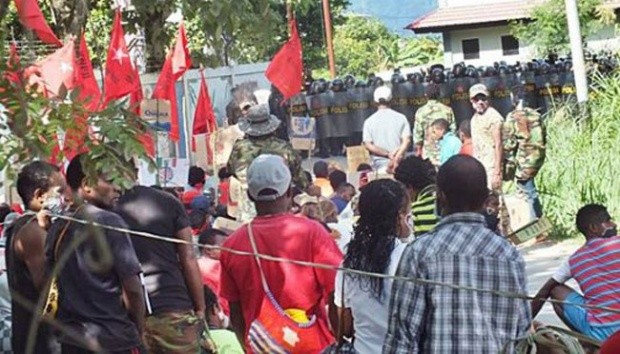Popular Reads
Top Results
Can't find what you're looking for?
View all search resultsPopular Reads
Top Results
Can't find what you're looking for?
View all search resultsRights groups urge police to drop ‘rebellion’ charge against KNPB activists
A rights advocate believes that the activists were arrested and subsequently charged merely to justify the police's raid and seizure of the KNPB's offices on Dec. 31, 2018.
Change text size
Gift Premium Articles
to Anyone
H
uman rights groups have called on the Papua Police to immediately and unconditionally drop the “rebellion” charge against three activists from the West Papua National Committee (KNPB) and release them.
Amnesty International and Yayasan Pusaka issued a recent statement saying that the activists "were prisoners of conscience" who had not employed violence or hatred, and were imprisoned solely for expressing their political views in a peaceful manner.
“The Indonesian authorities have used Article 106 of Indonesia’s Criminal Code, along with Article 110, to criminalize dozens of peaceful pro-independence political activists with the charge of rebellion in the last decade,” said Amnesty International Indonesia spokesman Haeril Halim.
The incident began on Dec. 31, when the Indonesian Military (TNI) and regional police raided and seized the KNPB headquarters in Timika, Mimika Baru district. Security forces have since been using the organization's offices as a TNI-police post.
A few days prior to the takeover, the KNPB had sent a letter notifying the police that the organization would be holding a religious prayer and traditional Papuan feast to celebrate its anniversary. The police, who did not present a warrant for either arrest or search, came to the organization's headquarters on the same day, arrested six activists and transported them to Timika Police Station. The police later released the activists without charge.
Halim said that the organization's legal representatives had sent a letter to the Mimika Police chief on Jan. 3, requesting that the security forces depart the KNPB offices and stop obstructing its members' access to the building.
On Jan 5, the Mimika Police summoned eight KNPB activists for questioning under suspicion of committing "acts of rebellion”. Three of the activists, Yanto Awerkion, Sem Asso and Edo Dogopia, were named as suspects and charged with rebellion on Jan. 8.
“Article 106 of the Criminal Code enables authorities to sentence a person to life imprisonment or a maximum of twenty years for any attempts undertaken with the intent to bring state territory, wholly or in part, under foreign rule or as a separate part thereof,” Halim said.
Feby Yoneska, an Indonesian Legal Aid Institute activist, shared his views, stressing that the organization's recent activities should not have been deemed to be violating the law.
"The article on rebellion can be applied only if it is proven that the activists prepared an attack with a subversive intention," he told The Jakarta Post.
He added that charging certain groups with rebellion was clearly a form of persecution.
In the past decade, the West Papua National Committee has organized mass demonstrations in several Papuan cities to call for a referendum for self-determination.
KNPB spokesperson Ones Suhuniap said it was unacceptable that someone could be charged with “rebellion” when they had merely voiced a different opinion. He said he believed that the charge was made only to justify the police's seizure of the organization's headquarters.
“This shows the terrible state of law enforcement in Indonesia,” he said.
The rights groups said that they took no stance on the political status of any Indonesian province, including calls for independence, and that the right to freedom of expression protected the right to peacefully advocate independence and other political solutions.
“In some cases, law enforcement use excessive force against peaceful protesters, but these cases are not adequately investigated and no one suspected of being responsible for them has ever been brought to justice,” Halim said. (ggq)










